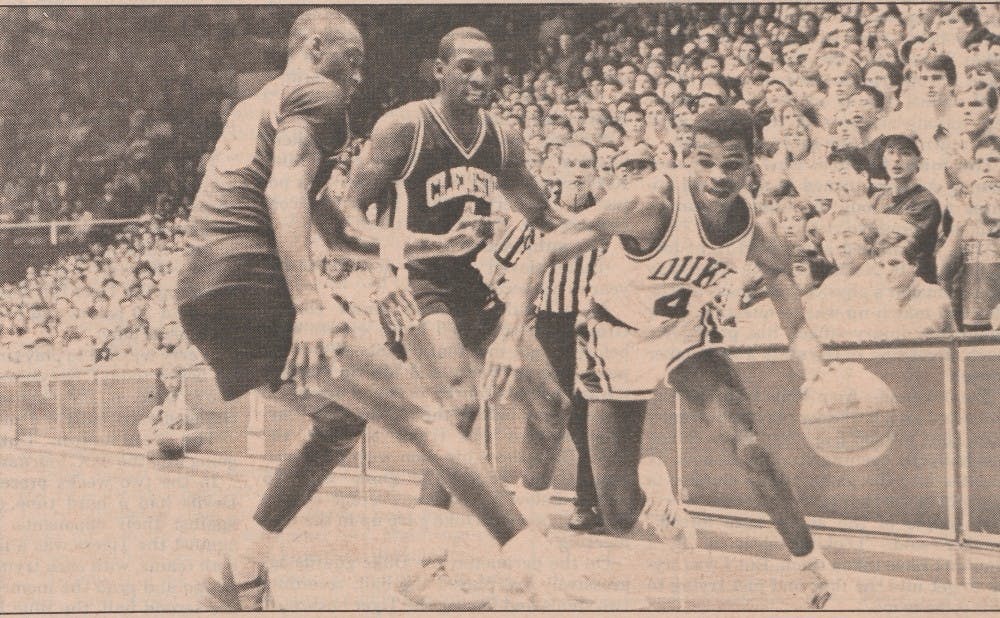After spending time in the ACC and Big Ten, Harvard head coach Tommy Amaker has transformed the Crimson into a trendy Cinderella pick in March. A four-year starter at point guard at Duke from 1983-87, Amaker graduated as the program's leader in single-season assists and career assist-to-turnover ratio. He was an assistant under head coach Mike Krzyzewski until 1997 before head coaching stints at Seton Hall, Michigan and Harvard, where he has been since the 2007-08 season. The Chronicle's Ryan Hoerger spoke with Amaker about the upcoming season. Below is a condensed version of their conversation:
The Chronicle: Siyani Chambers, one of your best players, will be missing the upcoming season due to an ACL injury. How are you and the rest of your program prepared to move forward from that?
Tommy Amaker: Well it’s devastating for Siyani, first and foremost. Being a senior and having a season-ending injury and certainly one that is going to require surgery—that’s a very tough blow for him, and obviously it’s a huge blow for us and our program and our prospects for this season. He’s our best player and our leading returning player and a captain and a three-time all-conference player.... In order to get the final year back of eligibility, he would have to withdraw from school, and he’s planning to do that. It’s a voluntary withdrawal that he’s taking, so he will return in the following season and have his final year.
TC: Since you've been at Harvard, is there a singular moment that stands out to you as a point of change, or has it been a more gradual process where the success has built on itself?
TA: We’ve been a program that, in some ways, I think has emerged on the scene pretty rapidly in terms of reputation and relevance for our program. I don’t know if it’s been one moment. You have to be lucky, you have to be good and lucky enough and I think we’ve been both. We’ve had some wonderful moments, like our first-ever Ivy League title, but we’ve won five in a row now. The first one was such a significant one because we had never ever done it before in the history of our school, and that’s kind of amazing to say that and think that at the time. Since then, we’ve been able to reel off five in a row, which now puts us in a position whereI think Penn is the only other program in the history of the Ivy League that has done that.
TC: Given that Harvard, due to its Ivy League membership, cannot offer athletic scholarships, what is your recruiting pitch like to recruits you are trying to draw to Harvard?
TA: Our league is structured differently. It’s a need-based financial aid, is how it’s referred to. If you need the money to go to school here and are still qualified and accepted to go to Harvard, then we’ll give it to you and that’s how things are structured. It’s very generous and we’re very proud of it. We’re very proud of how much money we have actually utilized for financial aid for the undergrad kids.... So we do feel like we have a strong brand and the success of our basketball program have made things very, very attractive for a kid who’s interested in this type of situation. We have certainly put ourselves in a position to be a strong contender for those types of student-athletes that are out there.
TC: Before Harvard, you coached at Duke and Michigan, two prominent basketball programs with very storied pasts. Has there been any difference in the type of kid you recruited at those schools and the kids you recruit at Harvard?
TA: Honestly, there’s not any difference. At those other schools and certainly here at Harvard, we’re trying to do the same thing. We’re trying to find the best player, the best kid and the best student. That hasn’t changed. We have been fortunate to be able to find a number of kids that have fit that bill for us and that have come on board and helped us grow our product and our brand and our program to the level where it is now. So there’s no change in that regard. Obviously, the Duke recruiting...that’s a whole different stratosphere with Duke and Kentucky and programs of that sort. But certainly if a kid is breaking for an elite academic school and wants a high-level basketball program, that we can interest that kid enough to take a hard look at Harvard.
TC: There seems to be a trend of Duke assistant coaches moving on to head coaching positions at schools that are very similar to Duke—relatively small private schools with a strong academic reputation and a big basketball tradition. Is that pure coincidence, or is there something more to that?
TA: I do think there probably is something to that. That profile and that type of environment is definitely a part of who we actually are. Not to speak for anybody else but to speak for myself, we can certainly connect with that. I’ve benefitted from that. I’m a beneficiary of that and I’m a product of that environment.... We always talk about, for a kid who’s a prospect, to look for something in a school or a program where it fits, where it makes sense and it’s the right feel. Maybe this has something to do with that as well for us as individuals, as coaches, as teachers and leaders on these respective campuses that it fits, and that’s certainly something I have recognized that’s worked well for me.
Get The Chronicle straight to your inbox
Signup for our weekly newsletter. Cancel at any time.

